Table of Contents
TLM-P's Career in Politics and the Post Office
TLM-P was active in community affairs from the early 1850s. In 1851 his status was recognised when he was one of the newly appointed Justice of the Peace (JP).1) In later years he was one of the magistrates appointed under the 'new Commission of the Peace' for Queensland.2)
In 1851 he also became a founding committee member of the Moreton Bay and Northern Districts Separation Association, which worked to create the separate colony of Queensland.3) He was also an early member of the Queensland Acclimatisation Society, a society founded in 1862 to promote understanding how imported agriculture could be adapted for colonial purposes.4) TLM-P was an elected member of its Council in 1863-65, and in 1874 became a Life Member.5)
In 1859, Queensland separated from the colony of NSW in 1859. TLM-P served as an Alderman on the Brisbane City Council from its inception that year until 1861.6) He was among the 19 eminent men who that year (1861) founded the Queensland Club. It was an elite Club which only the wealthy could afford and, until 1884 when a new Clubhouse was opened on its current site (19 George Street), was in Mary Street, Brisbane. In his diary of 1888 (27 June) he notes that his half-year subscription was £3.19.0 (over $1000 p.a. in 2022 values). TLM-P was a Committee member in 1870 and Vice-President in 1889-91. His barrister son Hervey joined in 1882; his eldest son Thomas de M. M-P joined in 1885; and his grandson Thomas B. M-P joined in 1912.7) The Queensland Club was and remains the meeting place for wealthy influential men (women are still not allowed to be members).8)
When Queensland separated from the colony of NSW in 1859, its settler (white) population was only around 28,000.9) The first Premier was Robert George Wyndham Herbert: TLM-P shared many of Herbert's values. As well, in the small world of colonial Australia, they had a connection: Herbert's cousin was George Wyndham on whose property TLM-P had gained his initial colonial experience.10) TLM-P represented the interests of squatters. They were never a unified bloc and, while conservative, were not always anti-liberal.11) TLM-P was identified with more conservative faction: 'the conservative rural interest' as opposed to 'the urban-liberal interest' group.12) The political system strongly favoured the interests of the wealthier rural landowners, so TLM-P largely represented dominant interests. The idea of mass democracy was still a radical idea and property owners were generally firm in their conviction that they alone had the right to rule - even if it did mean a few women managed to vote before legislation was amended to exclude them. TLM-P stood for the seat of East Moreton in the first election in 1860, urging electors to protect 'the interests of the squatter, the first occupier of the land'.13) He outlined his policies in a letter to the electorate in April 1860.14) His policies have been summarised as 'a land bill to ensure immigration by leasing Crown land for farming, with pre-emptive rights at any time during the currency of the lease, the establishment of a national system of education, and no state aid for religion.'15) When he failed to be elected, his sights turned to the public service.
Postmaster-General
In mid-1861 the Queensland Parliament, during Herbert's second term as Premier (21 July-7 August 1866), decided that the position of Postmaster-General should be combined with that of Postal Inspector. In doing so, it would become a professional, paid position rather than being held by a government minister.16) The following year, during Robert Mackenzie's term as Premier (15 August 1867-25 November 1868), TLM-P was appointed to the new post of Postmaster-General. Andrew Darbyshire states that Matilda M-P's brothers-in-law, fellow squatters William Barker and Charles Robert Haly, provided part of the necessary bond.17)
TLM-P was offered the position when he was 'in utter ignorance' about running a postal service, so he first took leave to go to Sydney to learn about his new role, leaving on the 16 August and returning on the 6 October.18) When the news leaked out, Brisbane's newspaper The Courier grudgingly approved: 'Whatever may be Mr. Prior's business talents, he certainly possesses valuable qualifications in his untiring energy and his indomitable perseverance, and in these respects he will afford a striking contrast to the gentlemen who usually find their way to the heads of government departments.'19) The Queensland correspondent for the Sydney Morning Herald was even more dubious: 'Mr. Prior is, or was, a squatter, but has, I believe, recently devoted himself to agricultural pursuits as well. In as far as personal activity is concerned he may be considered not unsuited to the office, but it may be doubted if his other qualifications be fully up to the mark, especially as he must necessarily be without experience in his new vocation. However, I must guard against the injustice of condemning him untried.'20)
In Sydney TLM-P was instructed in his new duties by the NSW Postmaster-General Major [William] Christie21) and the Secretary of the Department, Thomas Abbott. On his return he was appointed Postal Inspector (on 6 November 1861) and, on 1 January 1862, also Postmaster-General.22) The General Post Office staff at the time TLM-P was first appointed consisted of just 13 other employees including a postmistress; accountant/secretary/cashier; inland clerk; foreign dispatch clerk; one 3rd class clerk; one sorter; 4 letter carriers; one messenger and one sorter. The whole colony had just 24 post offices. Services such as money orders and telegraphs had yet to be offered.23) It was a lucrative appointment; Darbyshire points out that TLM-P's salary was £600, the same as, for example, the Private Secretary/Aide de Camp to the Governor. Women's salaries were less than men's so the GPO Postmistress Elise Barney received £475 (in salary and allowance) a year.24) It was also a powerful position in that it was the Postmaster-General who decided on new mail routes.
Documents from his time were once located at the Brisbane General Post Office Museum: this museum was closed in 2005 and the documents' whereabouts are not known.25)
TLM-P's periods as Postmaster-General are as follows:
1. 1862 - 1 March 1866: TLM-P's formal notice of appointment appeared in the press in January 1863.26) After taking up his appointment, he 'immediately set out on a tour of inspection' returning on 6 January 1862. After TLM-P served as Postmaster-General for four years, Parliament voted for the position of Postmaster-General to be again held by a politician. In order to retain his position, on 22 February 1866, the State Governor appointed TLM-P to Queensland's upper house, the Legislative Council
For a sample entry of one day of his 1862 diary about his work as Postmaster-General, see TLM-P's Diaries
This collage is entitled 'First Queensland ministry' with TLM-P's photo in the top left corner, so perhaps refers to the first ministry he served as Post-Master-General.27) 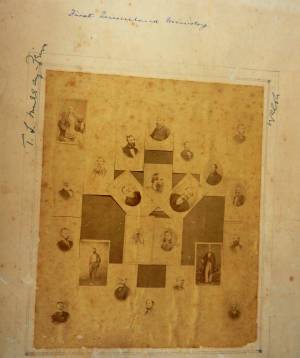
2. 21 July - 7 August 1866: TLM-P served as Postmaster-General in the government led by Sir Robert Herbert. That Government fell in July, meaning that TLM-P again lost his position as Postmaster-General, though he stayed on for another month until a successor was found.28)
3. 15 August 1867 to 25 November 1868: TLM-P again served as Postmaster-General under the government of the conservative Sir Robert Mackenzie. When a more liberal government was elected, TLM-P was out of office.
This period was one of more fluid party allegiances, and in 1867-68, TLM-P sided with church and women's groups in opposing a Contagious Diseases Act. Its passing meant that any woman in Queensland suspected of being a prostitute could be compulsory detained and medically examined.29)
4. 3 May 1870 to 8 November 1874: TLM-P was again Postmaster-General when the government reverted to a more conservative ministry headed by Sir Arthur Palmer.
It would take a specialised historian to properly assess TLM-P's success as Postmaster-General. It is possible that some assessment is made in Allan A. Morrison, Some Queensland postmasters-general, Brisbane:Post Office Historical Society, 1953. We do know that during 1862-74, when TLM-P was predominantly the Postmaster-General, the service underwent a major expansion. For example: in 1862 the money order system was introduced,30) and from 1865, saving bank deposits could be made at Queensland post offices. The increase in staff is another indication of growth: in 1865, TLM-P had a postal staff of 28; by 1872 the staff totalled 50.31) TLM-P was responsible for the much-needed new General Post Office32) which opened in Brisbane in 1872. The number of post offices increased from 23 in 1862 to 139 ten years later.33) In the 1860s, TLM-P opened up new routes serviced by Cobb and Co coaches.34)
In the 1870s, travelling post offices were opened on trains, the post and telegraph departments were amalgamated, and telegraphic communication was extended to remote areas, such as Cape York and the Gulf country.35) Much of the expansion was the result of the rapid growth of the white population - in 1861 to 1864 alone, Queensland's population (largely excluding Aboriginal people) doubled from just over 30,059 to 61,467.36) How much TLM-P facilitated the expansion of postal services to meet the increasing demand is not known. However, as a representative of the squatters' faction, it was in his own strong interest to maintain efficient and widespread postal services. And he certainly was active: his 1863 diary indicates that, in under two months, he rode 1,017 miles (1,636 km) as well as travelling by coastal steamer in a tour of inspection of the postal service.
The elegant proposed design of the GPO Brisbane: 37)
37)
An admiring view of his achievements as Postmaster-General comes from his entry in Australia's Representative Men. It states he 'may be said to be the first to have initiated the through mail service' (presumably to the UK), and the confidence of the authorities in his abilities was seen in his selection to negotiate with Batavia (now Jakarta) regarding the postal service (though he was unable to travel there himself). It described TLM-P up as a 'safe representative of the people' due to his 'unswerving integrity and disinterested loyalty'.38)
TLM-P (bottom left) with subsequent Postmasters-General of Queensland.39) 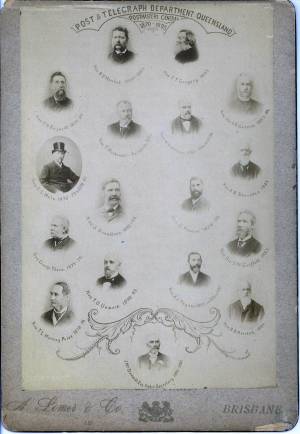
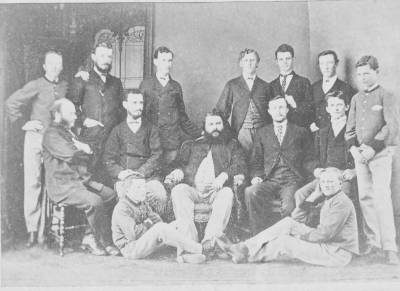 TLM-P has written on the back that this photo is of the 'Telegraph Department, officials Chief Office[ers?] Brisbane 1870[? or 1875? the last digit is unclear].40)
TLM-P has written on the back that this photo is of the 'Telegraph Department, officials Chief Office[ers?] Brisbane 1870[? or 1875? the last digit is unclear].40)
Following Tom A. M-P's initiative, this plaque on the Brisbane GPO has recently been restored.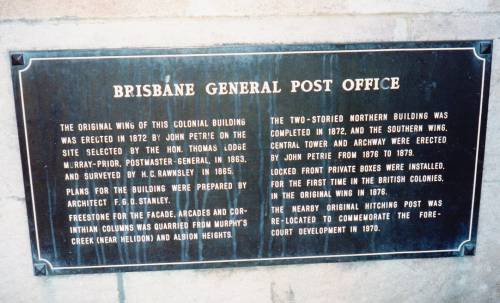
Legislative Council
TLM-P was appointed to Queensland's upper house, the Legislative Council on 22 February 1866. Such appointments were for life so he remained a member until his death in 31 December 1892.41)
The Legislative Council was dominated by conservative squatting interests, men whose interests aligned with TLM-P's. The concept was that the Legislative Councillors 'shall be a body of gentlemen of independent means and character, possessing a special aptitude for politics and inspired with a high sense of public duty. They are supposed … [to be] the best possible substitutes for the hereditary claims to pre-eminence and the inherited capacity for statesmanship, [of the British peerage]'. The Brisbane Courier warned that, if they did not live up to this 'standard of political superiority' then they could not 'justify their continued political existence' in a democracy.42) TLM-P defended the reputation of the Council against the Brisbane Courier's criticism. He argued that the article was, 'if not a breach of privilege, … very uncalled for. He said he was not in the habit of taking notice of what appeared in the papers, but as the journal in question was widely read by people outside, it might tend to place the Council in a very undeserved position. He had been away from the Council for the past fortnight, and if he had read “Hansard” correctly, he believed the Postmaster-General called the attention of the House to the fact of members being absent. The speaker admitted that he was one of those absent members, but he did not think his remarks applied to him at all, because if he were wanted, whatever his private business might be, his presence in the House was always to be relied upon. The Postmaster-General here interjected an encouraging “Hear, hear,” and Mr. Murray Prior continued that the government representative in that House had no doubt good reason for what he had said. He read the article which appeared in the Courier of Monday last, … to the effect that the Legislative Council had spent very little time over legislation, and they ought to be able to do a little real work now that there was an accumulation of work before the Upper House, that a nominee legislative body had no other strength than that given to it by public esteem, and that the prestige of the Council would be woefully impaired if it could be
shown that its members hindered public business out of sheer indolence. Such a paragraph, said Mr. Murray-Prior, was almost insolent, …. Instead of there being an accumulation of work, everything was gone through as rapidly as was consistent with the matter in hand. He hardly thought it was the duty of the Council, when a bill was before the other Chamber for three or four months, to pass it in a very short time, and bills had
been well considered by several hon. gentlemen before they were passed. The Postmaster General agreed in some measure with what had fallen from Mr. Murray-Prior. He could fairly claim to support the hon. gentleman in
his statement … and concluded by declaring that no fault could be found with the progress of business in this section of the Legislature.
In November 1885, TLM-P was again mentioned in the Courier Mail's report of the Legislative Council, opposing the Payment of Members (of the Legislative Assembly) Bill and other means to ensure the payments: 'The majority of the Legislative Council … entirely in the wrong, and in throwing away an opportunity offered them of influencing for good the legislation of the colony. They have taken their stand on an assumed right to amend a money bill, and have accordingly thrown out the section of the Appropriation Bill which provides fees for members of the Assembly. There are very few people in this colony outside … the Council … [believes the constitution] sanctions the interference of a nominated chamber with the control exercised by the representatives of the people over the public purse … The control of the purse by the chamber chosen by the taxpayers themselves is the very foundation of constitutional government. … The majority of the Council … put themselves entirely in the wrong. … It is no longer a question of payment of members-that point has been merged in the far more important issue [what, was not said] raised by Mr. Murray-Prior. … The Appropriation Bill [again was considered] … On resuming, the Postmaster-General moved the second reading of the bill. Mr. Murray-Prior, after twitting the Postmaster-General for not speaking to the second reading, declared that there were certain matters in the bill which would not meet with the approval of the Council He noticed that in one portion of the Estimates provision was made for … the expenses of members similar to the provisions in a bill rejected by the Council. It was a well-established rule of Parliament that the same question could not be taken into consideration in the same session when once it had been settled. It was his intention, on the committal of the bill, to move an amendment omitting that sum of money from the bill. After denying that there was any similitude between the constitution of the Imperial Parliament and our own, he said he proposed to stand within the four corners of the Constitution. Our Constitution was our bond, and whatever might be said as to the right of amending bills, that right was undoubted. The question was whether it was advisable for the Council to exercise that privilege. Under other circumstances he should decidedly have said that it would not be advisable to alter a money bill, and hitherto, ever since separation, the Council had refrained from so doing. He had thought over the matter and had tried to look at the end of the amendment he was about to propose. Ministers and others in the other place, who were custodians of the public purse, had, against all Parliamentary usage, voted money to themselves. It now became the duty of the Council to step in and assert their privileges and to avoid a recurrence of the same action on the part of the Assembly in the future, and
to preserve the money of the people. Wherever a wrong was done Nemesis followed and worse happened. The Council should do what was right and take the consequences. He did not take a stand on the privileges of the Council, for even those privileges should succumb to the good of the people. He took the position he had done believing that it would tend for the good of the people. At first he thought it would be better, in the present state of the country, to refrain from proposing any amendment, and let the bill pass. But on mature reflection, he could not see how they could make themselves particepes criminis. Another plan was that the Council should throw out the Estimates altogether, and some considered that that would be the best plan. But he proposed his amendment, in the first place, in order that the Council might exercise their rights, and, in the second place, in order to give an opportunity to Ministers to reconsider what they had done. If the Postmaster General and his colleagues wished the welfare of the country, and not to disturb the finances of the country, they would bring in another bill omitting the sum for the payment of members. Having asserted that the motive of his amendment was not to come into collusion with another House-“ Collision,”' corrected an hon. member - or to cause what was called a deadlock, he declared that it was meant solely for tho good of the country.' TLM-P's argument was supported by F.T. Gregory. The 'Postmaster-General, replying to the opening sneer of the Hon. Mr. Murray-Prior, said it was not customary for the leader of the Government in that Chamber to make a speech on the second reading of the Appropriation Bill, and that for reasons which must be self-apparent to every member of the House. … Having expressed astonishment that the Hon. Mr. Murray-Prior had left untouched the constitutional question, the hon. gentleman … that the Council could not amend a money bill … In rejecting the Payment of Members' Bill originally, the Council [opposed the will of the people]… The bill was then read a second time, and … when the question was put that the clause do pass, Mr. Murray-Prior moved its amendment reducing £1,804,575 to £1,797,575, which he said was “in fact to excise the vote of £7000 for the payment of members.” A divisuon was taken, when there voted for the amendment Messrs. Box, E. B. Porrest, W. Forrest, Graham, P. T. Gregory. A. C. Gregory, Hart, Lambert, Macpherson, Macdougall, Murray-Prior, Power, Smyth, Taylor, Thynne, and A H. Wilson-total, 16 … and against … Messrs, Cowlishaw, Foote, Holberton, King, Maodonald-Paterson, Pettigrew, and Swan ; total 7 … The amendment was, therefore, declared carried.(Brisbane Courier, 12 November 1885).
Other aspects of TLM-P's Political Career
On 16 October 1888 diary, TLM-P wrote that 'Mr Thynne' spoke to him - this was Edward Thynne, the Representative of Government in the Legislative Council who 'said ministers had come to the conclusion that I was to take the Chair [of Committees] which rather took me by surprise.' The next day he was 'feeling anxious about being in the Chair, told Tynne not to hurry and I would not mind if I were left out. However to be as ready as I could, looked over the work and prepared, but was not sure the Govt. had not altered their plans till near the meeting. When Thynne proposed and I was put into the Chair as Presiding Chairman, returned thanks after reading prayers in a few words, felt very nervous, but got through the work which fortunately was not long somehow…. All members of both Houses kind in their congratulations.' The man who was soon to be Premier Boyd_Dunlop_Morehead 'said that Ministers thought it was a tardy recognition of my services and should have been done before. … Appointed by Legislative Council - PRESIDING CHAIRMAN - during the time President is Administrator of the Government'. The following day Arthur_Hunter_Palmer, the President of the Legislative Council, lent him his robes and 'Kelly the messenger helped me to dress, cannot say I felt very comfortable in my new dignity, however not so nervous as yesterday and got thro the work which was very short, well. I was sorry not to see' John_Frederick_McDougall 'in his place hope he does not feel sore about not being put into the Chair, he could not think that I had anything to do with it. '
On 3 November 1888, TLM-P was waiting for Parliament to be prorogued. He joined around 20 members and former members for a lunch onboard a boat hosted by Thynne. To his surprise, Judge Mein 'got up and proposed my health, complimenting me on being in the Chair and other things. It is seldom I am brought prominently out, and felt very much as if it (poking fun) however returned thanks and proposed our host and leader Mr Thynne… very enjoyable day'.
In his 1888 diary (30 October) TLM-P contemplated becoming Chairman of Committees - a possibility due to the illness of 'poor old Roberts', ie Daniel Roberts, who died in 1889. TLM-P mused, 'This would necessitate my return before next Session and if obtained would give me employment, a good reason to live in Brisbane, and salary £500 per annum for very small work; so far just suit me, but whether the restraint and giving up my last Summer in England is not paying dear for a chance.' On 7 November 1888, he noted in his diary that 'Palmer seemed to like the idea of my being Chairman of Committees if I would take it, but said that I would have to be back at the opening, this is of course should I not be there another will be appointed and my chance gone in future.'
Roberts eventually died, still in office as Chairman of Committees in the Legislative Council, on 26 July 1889. On 31 July 1889, TLM-P was subsequently appointed to the position, a post he retained until his death. As Chairman, when Sir Arthur Palmer the President of the Council was absent, TLM-P 'frequently occupied' the position of the Council's President.43)
This elegant illuminated letter of condolence stressed his friendship with 'most' of his political colleagues, and his status as a Queensland pioneer.44) 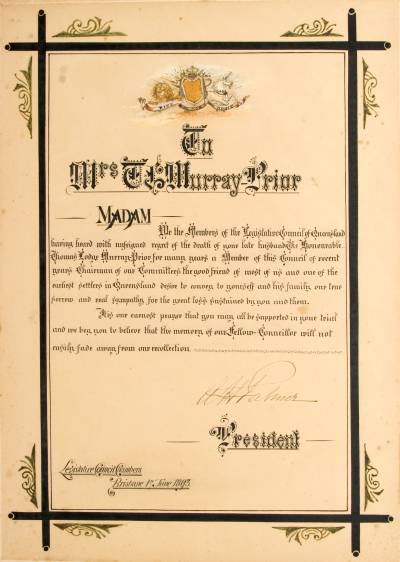
Throughout his political career, TLM-P was active in defence of broad rural as well squatter interests: amongst other things he took charge of getting the Crown Lands Alienation Act of 186845) through the Legislative Council - ironically this act aimed to stop people selecting land in their relatives' names, something it is likely TLM-P did himself. He also consistently opposed the payment of members of parliament, effectively limiting parliamentarians to those who could afford to work voluntarily.46) His wife Nora was one of his political admirers, writing to her step-daughter Rosa that 'It does my heart good to see him in his right place - a recognised leader & clear headed man.'47) In a parliamentary debate on the Queensland Constitution Bill in October 1892, 'Mr Murray Prior said that the time would come when nominee Houses would cease to exist in Australia. He referred to the recent action of the New Zealand Government, and said as a nominee House the Council was at the mercy of the Government, and would be in a far stronger
position if elected. When the bill was first introduced he thought they were to have self-government among the different provinces, and to have three provinces, but the present bill was very different. He thought the bill should go before the country, and after that be framed on a different basis, which would include three provinces. The [Legislative] Council would always neglect self interest for the for advancement of the colony as a whole'.48)
Pugh's Almanac and Queensland Directory (1889, p.525) lists him as 'Prior Hon. Thomas Lodge Murray M.L.C., J.P. Maroon Ipswich'.
Reference: D. Waterson, A Biographical Register of the Queensland Parliament 1860-1929, Canberra: ANU Press, 1972, p.135.
Elise Barney
TLM-P had a very public clash with one of the few women to have lucrative, responsible employment. For TLM-P, conservative views on women's roles and self-interest combined when he was offered the position of Postmaster-General, over the claims of Elise Barney, Brisbane Postmistress during 1855-65.49) Historian Desley Deacon has outlined how Elise Barney had taken over the lucrative position when her husband, the previous postmaster, died. Her son Whiston Barney became her assistant. When Queensland became a separate colony, Elise Barney automatically became the head of the new postal department, responsible only to the politician appointed Acting Postmaster-General. Her work was soon officially found to be 'in every respect satisfactory'. When the new Queensland Government decided to combine the Postmaster-General position with that of Postal Inspector and to make it a public service position, a 'long and bitter struggle' ensued between TLM-P and Elise Barney, supported by her son. It was not helped by TLM-P having to have his office in the building in which the Barneys had lived and worked for years. As well, combining the Postmaster-General position with that of Postal Inspector travelling throughout the colony, suggests a deliberative move to exclude Mrs Barney. Such inspections would be too dangerous, and seen as too arduous, for a woman travelling alone as did TLM-P. Whiston Barney resigned under pressure in mid-1863; in 1864 Mrs Barney was placed on leave after a clerk 'nominally' under her supervision embezzled funds. A Public Service Enquiry criticised both TLM-P and Elise Barney; a subsequent parliamentary Select Committee exonerated them. It appears that sympathy and blame remained equally proportioned between the two. Elise Barney was retired on a generous pension while TLM-P, as seen, was appointed to the Legislative Council when the Postmaster-General position again became a ministerial one.50)